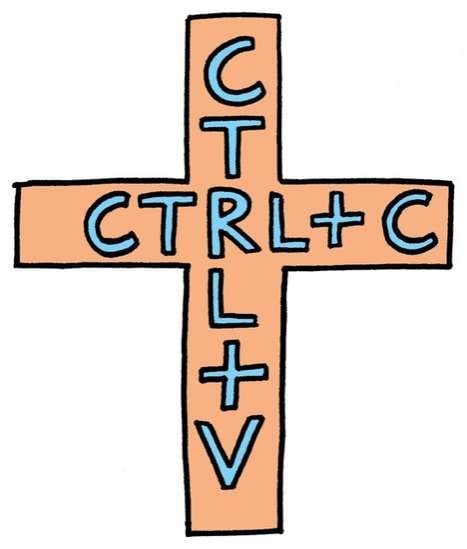
Kopimism is Now an Officially Recognized Form of Faith
Jordy E — January 24, 2012 — Social Good
References: kopimistsamfundet & vice
Sweden has recently acknowledged Kopimism as an official religion. Based on the veneration of file-sharing, this 21st century religious movement has already accumulated 4,000 members with adherents based in Canada, Russia, France and Romania.
The symbols most coveted by Kopimists are CTRL+C and CTRL+V, effectively turning traditional religious emblems on their head. According to Kopimism’s founder Isak Gerson, the copying and spreading of information is a holy act and is moreover critical to human thought.
For those concerned about not being able to attend mass in Sweden, don’t worry, as Kopimists gather on the Internet. Oh, and beware of the creators of Copyright, also known as the devil.
It’s quite apparent that Sweden’s canonization of Kopimism coincides perfectly with the current debate surrounding the SOPA and PIPA bills, acts which threaten the very foundations of this newbie religion. Coincidence? I think not.
The symbols most coveted by Kopimists are CTRL+C and CTRL+V, effectively turning traditional religious emblems on their head. According to Kopimism’s founder Isak Gerson, the copying and spreading of information is a holy act and is moreover critical to human thought.
For those concerned about not being able to attend mass in Sweden, don’t worry, as Kopimists gather on the Internet. Oh, and beware of the creators of Copyright, also known as the devil.
It’s quite apparent that Sweden’s canonization of Kopimism coincides perfectly with the current debate surrounding the SOPA and PIPA bills, acts which threaten the very foundations of this newbie religion. Coincidence? I think not.
Trend Themes
1. Digital Religion - Embracing file-sharing as a holy act, the trend of digital religion challenges traditional religious norms and offers new opportunities for online communities.
2. Copyright Debate - The ongoing debate about copyright laws and regulations presents an opportunity for disruptive innovation in the intellectual property industry.
3. Online Gathering Spaces - The rise of online gathering spaces for religious activities provides opportunities for disruptive innovation in the virtual community industry.
Industry Implications
1. Religious Services - The recognition of Kopimism as an official religion opens up new potential in the religious services industry for catering to unique, digitally-focused religious communities.
2. Intellectual Property - The emergence of file-sharing religions like Kopimism calls for disruptive innovation in the intellectual property industry to find new ways of balancing copyright protection and information sharing.
3. Virtual Communities - The online gathering of Kopimists highlights the need for disruptive innovation in the virtual community industry to provide platforms and services for digital religious groups.
3
Score
Popularity
Activity
Freshness
























